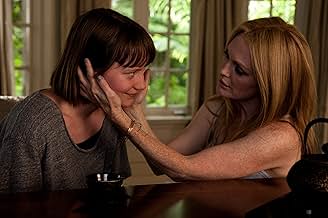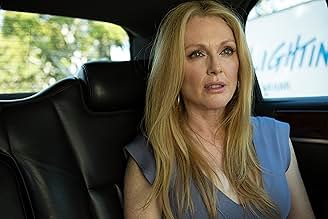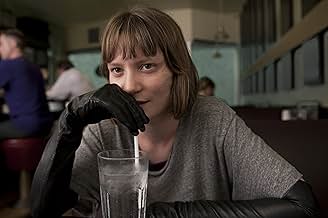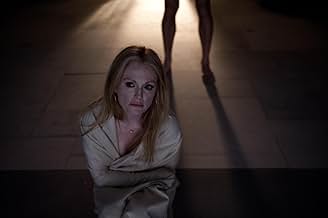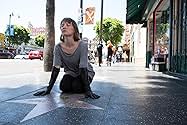CALIFICACIÓN DE IMDb
6.2/10
44 k
TU CALIFICACIÓN
Una mirada íntima a una familia de Hollywood que persigue la fama y se enfrenta a fantasmas del pasado.Una mirada íntima a una familia de Hollywood que persigue la fama y se enfrenta a fantasmas del pasado.Una mirada íntima a una familia de Hollywood que persigue la fama y se enfrenta a fantasmas del pasado.
- Premios
- 10 premios ganados y 24 nominaciones en total
- Dirección
- Guionista
- Todo el elenco y el equipo
- Producción, taquilla y más en IMDbPro
Opiniones destacadas
A film worth revisiting, if my experience is anything to go by. I didn't think it was up to much the first time, but the BBC put it on again and this time I watched it twice and probably will at least once more, partly for Julianne Moore, who's pretty astonishing, playing an almost unprecedentedly monstrous grotesque, and partly for the frequent patches of brilliantly written dialogue (take a bow, Bruce Wagner). Moore's dialogue is almost always good, but that of 13-year-old move star and recovering drug abuser Benji also packs a vicious punch, and elsewhere, more subtly, in the mouths of Mia Wasikovska and Robert Pattinson's characters, Wagner does probably the best depiction I've ever seen of how young adults actually talk a lot of the time: confused, insecure and just barely covering it up.
All this is something like what we might see - and most importantly hear - if anyone ever filmed a Brett Eason Ellis novel properly, without being afraid of going to town on the dialogue (why hasn't Cronenburg ever worked with Ellis?). As such, it's an interesting point of comparison with Cronenburg's previous film, Cosmopolis, also heavy on the chilly, anomic modern rich person dialogue, courtesy of Don de Lillo, which, taken on its own, looks like woefully pretentious proof that you can't do this in film. Turns out you can, with bells on, though actually, Cronenburg films have been demonstrating this at least since Dead Ringers.
Other than these talky highlights, I think this film has a few problems of its own, some of them maybe also around pretentiousness. The big one for me is just the messiness of the message and plot, as a unity, which it isn't really. Moore's storyline on its own is a perfect, pitilessly poisonous Hollywood satire. Does it really need, in addition, a parallel plot that never quite meshes about incest and schizophrenia? Why? To round it out to feature film length? To give it some spurious intellectual heft in the form of references to Greek tragedy and elemental symbolism?
To be honest, there may be a puzzle here that I haven't worked out, because quite a lot of that dialogue I like so much seems to be satirising precisely such tendencies, particularly when Moore's character ghoulishly invokes fire and water to implicitly celebrate the death of a child because it gets her a part. And that's another reason I might watch again. But still, the problem remains, I don't think you need the incest or the schizophrenia to satirise Hollywood, because it introduces a sort of separate issue, a distinct emotional antagonist if you will, where Hollywood itself seems like the real target and should surely be all you need to explain all this very bad behaviour.
All this is something like what we might see - and most importantly hear - if anyone ever filmed a Brett Eason Ellis novel properly, without being afraid of going to town on the dialogue (why hasn't Cronenburg ever worked with Ellis?). As such, it's an interesting point of comparison with Cronenburg's previous film, Cosmopolis, also heavy on the chilly, anomic modern rich person dialogue, courtesy of Don de Lillo, which, taken on its own, looks like woefully pretentious proof that you can't do this in film. Turns out you can, with bells on, though actually, Cronenburg films have been demonstrating this at least since Dead Ringers.
Other than these talky highlights, I think this film has a few problems of its own, some of them maybe also around pretentiousness. The big one for me is just the messiness of the message and plot, as a unity, which it isn't really. Moore's storyline on its own is a perfect, pitilessly poisonous Hollywood satire. Does it really need, in addition, a parallel plot that never quite meshes about incest and schizophrenia? Why? To round it out to feature film length? To give it some spurious intellectual heft in the form of references to Greek tragedy and elemental symbolism?
To be honest, there may be a puzzle here that I haven't worked out, because quite a lot of that dialogue I like so much seems to be satirising precisely such tendencies, particularly when Moore's character ghoulishly invokes fire and water to implicitly celebrate the death of a child because it gets her a part. And that's another reason I might watch again. But still, the problem remains, I don't think you need the incest or the schizophrenia to satirise Hollywood, because it introduces a sort of separate issue, a distinct emotional antagonist if you will, where Hollywood itself seems like the real target and should surely be all you need to explain all this very bad behaviour.
Daivd Cronenberg's 'Maps to the Stars' tells the convergent stories of several different characters in Hollywood: at first it appears as if this is one of those films about discrete lives that form a fine web of faint touches, but in fact it turns out that (most) of the characters have serious history, and are coming back together after events that have driven them apart. This reveal is quite well-plotted; the problem is that the characters are all mostly nasty (or at the very least weird), and moreover are so in a uniquely Hollywood way - you can believe there are such people in and around the movie business, but they're simply not the sort of people that most of us meet in our everyday lives. This makes it quite hard to sympathise with them, even if we can see the reason for their meanness and oddness. Cronenberg's movies can be considered cold in general, and although the charge isn't always justified, I watched this one very much from the outside. One thing it isn't, in spite of its billing as such, is a comedy.
We used to expect gross-out horror from David Cronenberg. Now he gives us weird and weirder. MAPS TO THE STARS is set in a Tinseltown of designer homes, designer shops and exclusive restaurants. The background 'sheen' is reminiscent of an Almodovar movie, plus there's a Gothic element borrowed from Shyamalan (Agatha and Benjie see dead people). Julianne Moore's performance is in the kind of hyper-drive she brought to BOOGIE NIGHTS, which helps to power the movie's gearshift from Hollywood satire into violent melodrama. One of the themes is incest, which surely needed a deeper and subtler exploration.
Robert Pattinson takes another step away from the Twilight Zone in the role of a limo driver with screen writing aspirations (like every other chauffeur in Los Angeles). Cronenberg is clearly reaching out towards a more discerning class of viewer. MAPS TO THE STARS is very much an 'auteur' movie, highly intelligent and stylized, but perhaps perched uncomfortably between satire and psychodrama.
Robert Pattinson takes another step away from the Twilight Zone in the role of a limo driver with screen writing aspirations (like every other chauffeur in Los Angeles). Cronenberg is clearly reaching out towards a more discerning class of viewer. MAPS TO THE STARS is very much an 'auteur' movie, highly intelligent and stylized, but perhaps perched uncomfortably between satire and psychodrama.
Hollywood never looks to kindly at itself when doing films about the lives of folks who make movies. But the Weiss family in Maps To The Stars are a really outstanding collection of freaks and weirdos.
Meet the Weisses. Father is John Cusack who is one of those self help promoting gurus making a fast buck on the lecture circuit and writing. His wife Olivia Williams is hardly a stay at home mom, she's out managing the career of their son Evan Bird who after time in a rehab is looking to make a comeback as a teen. That in itself is a sad new Hollywood tradition. From the time of Jackie Coogan child stars who emerge as chief breadwinners in their families have had unique and tragic stories. Bird gives his parents standing that they might never acquire on their own at the cost of a faintly normal childhood.
There's a fourth Weiss, another child played by Mia Wasikowska whose arrival by train sets the stage for the story. She's ordered a limousine and has the money to pay for it. Wasikowska chats up the driver, a hunky aspiring actor himself played by Robert Pattinson.
As the story unfolds we learn that Wasikowska has been living in Florida in an asylum, put there by her family after she set a fire. All this done with the prime object of keeping news of it away from the tabloid press. Can't have her brother's career and her father's racket be the subject of scandal.
Carrie Fisher makes a brief appearance as herself and Wasikowska has struck up a relationship with her via the Internet. Probably looking to palm off an eager, but obtrusive fan she suggest that actress Julianne Moore take her on as a 'personal assistant'.
Moore is a piece of work herself. She's a great lesson that Bird might not have the maturity to comprehend. It's the direction he's well on the way to. A totally self absorbed, self indulgent creature who thinks the whole world revolves around her. She's obsessed with playing her mother who was a great star who died in a fire like Linda Darnell back in the day. In her own imaginings she talks with her mother who puts her down for not having the talent to back up the ego.
Bird who is a Moore in training also has visions. His visitor is a little girl who was terminally ill whom he made a hospital visit for. No doubt he cheered her up in those last hours, but his psyche knows that maybe she sees him for what he is. Bird is also bright enough to see the path he's on, but can't do anything about it.
I suppose a certain amount of narcissism in show business is necessary to succeed. But Maps To The Stars is an ode to narcissism like I've never seen before on the big screen.
If I had to pick out someone who stood out in Maps To The Stars for me it's Evan Bird. I hope he's nothing like his character in the film in real life because anyone who's got to associate with him is in for one bumpy ride. But God only knows he's got any number of examples in real life to have studied for this role.
Another nasty bit of self analysis Maps To The Stars from Tinseltown.
Meet the Weisses. Father is John Cusack who is one of those self help promoting gurus making a fast buck on the lecture circuit and writing. His wife Olivia Williams is hardly a stay at home mom, she's out managing the career of their son Evan Bird who after time in a rehab is looking to make a comeback as a teen. That in itself is a sad new Hollywood tradition. From the time of Jackie Coogan child stars who emerge as chief breadwinners in their families have had unique and tragic stories. Bird gives his parents standing that they might never acquire on their own at the cost of a faintly normal childhood.
There's a fourth Weiss, another child played by Mia Wasikowska whose arrival by train sets the stage for the story. She's ordered a limousine and has the money to pay for it. Wasikowska chats up the driver, a hunky aspiring actor himself played by Robert Pattinson.
As the story unfolds we learn that Wasikowska has been living in Florida in an asylum, put there by her family after she set a fire. All this done with the prime object of keeping news of it away from the tabloid press. Can't have her brother's career and her father's racket be the subject of scandal.
Carrie Fisher makes a brief appearance as herself and Wasikowska has struck up a relationship with her via the Internet. Probably looking to palm off an eager, but obtrusive fan she suggest that actress Julianne Moore take her on as a 'personal assistant'.
Moore is a piece of work herself. She's a great lesson that Bird might not have the maturity to comprehend. It's the direction he's well on the way to. A totally self absorbed, self indulgent creature who thinks the whole world revolves around her. She's obsessed with playing her mother who was a great star who died in a fire like Linda Darnell back in the day. In her own imaginings she talks with her mother who puts her down for not having the talent to back up the ego.
Bird who is a Moore in training also has visions. His visitor is a little girl who was terminally ill whom he made a hospital visit for. No doubt he cheered her up in those last hours, but his psyche knows that maybe she sees him for what he is. Bird is also bright enough to see the path he's on, but can't do anything about it.
I suppose a certain amount of narcissism in show business is necessary to succeed. But Maps To The Stars is an ode to narcissism like I've never seen before on the big screen.
If I had to pick out someone who stood out in Maps To The Stars for me it's Evan Bird. I hope he's nothing like his character in the film in real life because anyone who's got to associate with him is in for one bumpy ride. But God only knows he's got any number of examples in real life to have studied for this role.
Another nasty bit of self analysis Maps To The Stars from Tinseltown.
Most of David Cronenberg's films range from good to outstanding. Some of his work disappointed me or evoked a relatively mixed reaction from me, but on the most part he is a very interesting director who does stand out in a good way. The cast are very talented, Julianne Moore especially, while one can understand why Cronenberg frequently used Howard Shore as his composer of choice and their collaborations is one of the best and most consistent director-composer collaborations in my view (am especially fond of his work for 'The Fly').
It is said with sadness that despite hearing good things about it (though it's understandably very polarising here), 'Maps to the Stars' disappointed me. It is far from a terrible film, don't even think it's a bad film, but it for me was a long way from great. Much to admire but do have to share some of the criticisms here, a great concept with inconsistent execution of it. As far as Cronenberg's work goes, 'Maps to the Stars' is better than 'Stereo', 'Crimes of the Future' and 'Cosmopolis' but it is a lesser film of his, nowhere near the level of 'The Fly', 'Dead Ringers', 'Eastern Promises', 'A History of Violence' and 'Spider'.
There are good things with 'Maps to the Stars'. It looks wonderful, excepting the somewhat fake-looking fire, then again it is Cronenberg whose work from the late 1970s onwards always ranked high on a visual level (of his overall output 'Rabid' and 'Shivers' were the only real exceptions in this regard). The cinematography is stylish and quite stunning to look at, sunshine has rarely blazed in such a wonderfully dazzling way in film. Shore's score is subtly unsettling and Cronenberg does deliver in the visual aspect of his directing.
Some of the satire is fiercely sharp and darkly funny and it is the satire where 'Maps to the Stars' fares best. Really admired the cast here, with Moore being excellent in the lead in her best performance in years (perhaps since 'Boogie Nights'). Evan Bird shows himself to be a young actor with huge potential, a very beyond his years performance. Have not seen a better performance from Mia Wasikowska in her most daring role and she is very affecting in it, seeing John Cusack and Olivia Williams in different roles and excelling was great to see. Robert Pattinson is much better than he was in 'Cosmopolis' and as others have said he has come on a long way since 'Twilight'.
For all those great things, 'Maps to the Stars' just didn't connect with me. Despite a promising start, there is a major change of tone that jars badly and then the film becomes unfocused and rather strange. The satirical edge is done well, but the vulgarity does get very over-the-top and mean-spirited and the cynical edge is overdone at times too. The more surreal elements didn't come over as either dreamlike or nightmarish, not much eerie here, too much of the scenes veered on ridiculous and felt very hokey. Emotionally, 'Maps to the Stars' should have been poignant but it felt too cold and clinical (Cronenberg's direction on the most part is the same). The pace can drag and with the trimming or excision of scenes that felt like padding that added nothing it would have felt much better. Cronenberg can do weird and disturbing very well, evident when he pioneered body horror, but very rarely to to such kitchen-sink or muddled effect.
Didn't feel for any of the characters apart from disgust, am aware they were not meant to be likeable and be unpleasant but the film failed too to make them properly fleshed out. The only character who came close to evoking any sympathy from me was Agatha, then her true colours were revealed and that was lost. Found that the film tried to do too many things and have too many strands and elements, and too many of them were given short shrift (the Cusack and Olivia Williams subplot was severely under-explored) or became convoluted, with too many things leaving the viewer perplexed due to being unexplained or poorly resolved. The script is not as rambling or bloated as that for 'Cosmopolis' but it is the most gratuitously crass script of any Cronenberg film and never sounds natural. The ending felt tacked on.
Altogether, not my cup of tea sadly but did find still a good number of great things about it. 5/10
It is said with sadness that despite hearing good things about it (though it's understandably very polarising here), 'Maps to the Stars' disappointed me. It is far from a terrible film, don't even think it's a bad film, but it for me was a long way from great. Much to admire but do have to share some of the criticisms here, a great concept with inconsistent execution of it. As far as Cronenberg's work goes, 'Maps to the Stars' is better than 'Stereo', 'Crimes of the Future' and 'Cosmopolis' but it is a lesser film of his, nowhere near the level of 'The Fly', 'Dead Ringers', 'Eastern Promises', 'A History of Violence' and 'Spider'.
There are good things with 'Maps to the Stars'. It looks wonderful, excepting the somewhat fake-looking fire, then again it is Cronenberg whose work from the late 1970s onwards always ranked high on a visual level (of his overall output 'Rabid' and 'Shivers' were the only real exceptions in this regard). The cinematography is stylish and quite stunning to look at, sunshine has rarely blazed in such a wonderfully dazzling way in film. Shore's score is subtly unsettling and Cronenberg does deliver in the visual aspect of his directing.
Some of the satire is fiercely sharp and darkly funny and it is the satire where 'Maps to the Stars' fares best. Really admired the cast here, with Moore being excellent in the lead in her best performance in years (perhaps since 'Boogie Nights'). Evan Bird shows himself to be a young actor with huge potential, a very beyond his years performance. Have not seen a better performance from Mia Wasikowska in her most daring role and she is very affecting in it, seeing John Cusack and Olivia Williams in different roles and excelling was great to see. Robert Pattinson is much better than he was in 'Cosmopolis' and as others have said he has come on a long way since 'Twilight'.
For all those great things, 'Maps to the Stars' just didn't connect with me. Despite a promising start, there is a major change of tone that jars badly and then the film becomes unfocused and rather strange. The satirical edge is done well, but the vulgarity does get very over-the-top and mean-spirited and the cynical edge is overdone at times too. The more surreal elements didn't come over as either dreamlike or nightmarish, not much eerie here, too much of the scenes veered on ridiculous and felt very hokey. Emotionally, 'Maps to the Stars' should have been poignant but it felt too cold and clinical (Cronenberg's direction on the most part is the same). The pace can drag and with the trimming or excision of scenes that felt like padding that added nothing it would have felt much better. Cronenberg can do weird and disturbing very well, evident when he pioneered body horror, but very rarely to to such kitchen-sink or muddled effect.
Didn't feel for any of the characters apart from disgust, am aware they were not meant to be likeable and be unpleasant but the film failed too to make them properly fleshed out. The only character who came close to evoking any sympathy from me was Agatha, then her true colours were revealed and that was lost. Found that the film tried to do too many things and have too many strands and elements, and too many of them were given short shrift (the Cusack and Olivia Williams subplot was severely under-explored) or became convoluted, with too many things leaving the viewer perplexed due to being unexplained or poorly resolved. The script is not as rambling or bloated as that for 'Cosmopolis' but it is the most gratuitously crass script of any Cronenberg film and never sounds natural. The ending felt tacked on.
Altogether, not my cup of tea sadly but did find still a good number of great things about it. 5/10
¿Sabías que…?
- TriviaAccording to screenwriter Bruce Wagner, the casting of Robert Pattinson was what finally got the movie made, financially speaking.
- ErroresWhen Jerome is driving Havana, they are in a long wheelbase 'L' version of Lincoln Town Car, when they've arrived at her house and are having sex in the back, they are in a standard wheelbase version (it has a shorter quarter glass section in the rear door window).
- Citas
Agatha Weiss: [Agatha recites poetry from Paul Éluard's poem, Liberty, translated from French] On my school notebook, on my desk and the trees, on the sand and the snow, I write your name. On all the flesh that says yes, on the forehead of my friends, on every hand held out, I write your name. Liberty.
- ConexionesFeatured in Renegade Cut: Maps to the Stars (2015)
- Bandas sonorasNa Na Hey Hey Kiss Him Goodbye
Written by Gary DeCarlo,Paul Leka and Dale Frashuer
Performed by Julianne Moore and Mia Wasikowska
Selecciones populares
Inicia sesión para calificar y agrega a la lista de videos para obtener recomendaciones personalizadas
- How long is Maps to the Stars?Con tecnología de Alexa
Detalles
- Fecha de lanzamiento
- Países de origen
- Sitio oficial
- Idioma
- También se conoce como
- Maps to the Stars
- Locaciones de filmación
- Productoras
- Ver más créditos de la compañía en IMDbPro
Taquilla
- Presupuesto
- USD 15,000,000 (estimado)
- Total en EE. UU. y Canadá
- USD 350,741
- Fin de semana de estreno en EE. UU. y Canadá
- USD 143,422
- 1 mar 2015
- Total a nivel mundial
- USD 4,510,934
- Tiempo de ejecución
- 1h 51min(111 min)
- Color
- Mezcla de sonido
- Relación de aspecto
- 1.85 : 1
Contribuir a esta página
Sugiere una edición o agrega el contenido que falta







